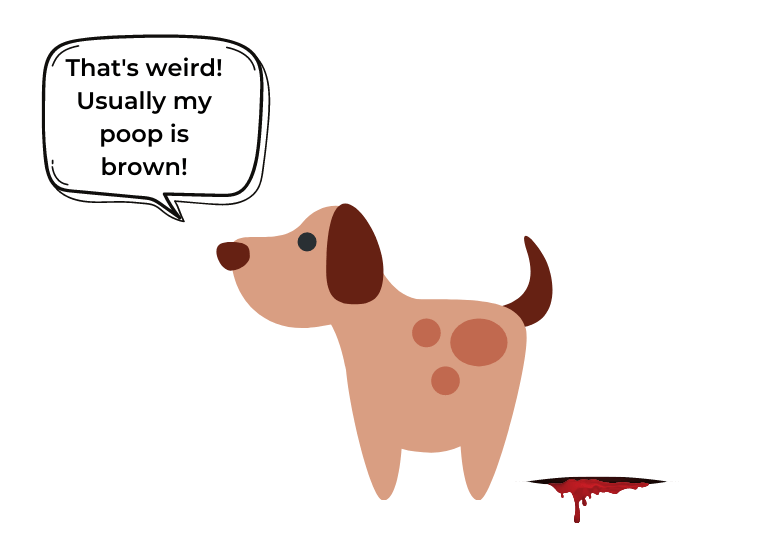If you have noticed blood in your dog’s poop, it is an indication that something is not right. Although seeing blood in your puppy’s stool might be alarming due to its association with cancer, there are a wide range of factors that can cause puppies to poop blood.
Dogs can develop serious medical problems, including gastrointestinal bleeding. If your puppy is pooping blood, it is important to see a vet as soon as possible.
Sometimes the problem can be easily resolved, but other times it can be a sign of a more serious issue.
| Cause of Blood in Puppy Stool | Symptoms | Diagnostic Tests | Treatment Options |
|---|---|---|---|
| Parasites | Diarrhea, lethargy, weight loss, poor coat condition, visible worms in stool | Fecal exam, blood test, ELISA test, PCR test | Deworming medication, supportive care, environmental cleaning, flea control |
| Dietary Issues | Diarrhea, vomiting, abdominal pain, loss of appetite, dietary history | Physical examination, dietary history, blood test, fecal exam, endoscopy | Dietary changes, medication to relieve symptoms, probiotics, IV fluids |
| Infections | Diarrhea, vomiting, fever, dehydration, loss of appetite, bacterial culture | Fecal exam, blood test, urine test, bacterial culture, imaging tests | Antibiotics, supportive care, IV fluids, isolation |
| Inflammatory Bowel Disease (IBD) | Chronic diarrhea, vomiting, weight loss, poor appetite, abdominal pain | Physical examination, blood test, fecal exam, endoscopy, biopsy | Dietary changes, medication to suppress inflammation, probiotics |
| Parvovirus | Bloody diarrhea, vomiting, fever, lethargy, loss of appetite | Physical examination, blood test, fecal test, viral antigen test, PCR test | Hospitalization, IV fluids, anti-nausea medication, antibiotics |
| Hemorrhagic Gastroenteritis (HGE) | Bloody diarrhea, vomiting, dehydration, abdominal pain | Physical examination, blood test, fecal exam, imaging tests | IV fluids, anti-nausea medication, antibiotics |
| Intussusception | Vomiting, bloody diarrhea, abdominal pain, weakness, lethargy | Physical examination, blood test, fecal exam, imaging tests | Surgery, supportive care |
| Foreign Object Ingestion | Vomiting, diarrhea, loss of appetite, lethargy, abdominal pain | Physical examination, blood test, fecal exam, imaging tests | Endoscopy, surgery |
| Cancer | Bloody diarrhea, vomiting, weight loss, lethargy, loss of appetite | Physical examination, blood test, fecal exam, imaging tests, biopsy | Surgery, chemotherapy, radiation therapy |
| Other Health Issues | Diarrhea, vomiting, lethargy, weight loss, difficulty breathing | Physical examination, blood test, imaging tests | Treatment depends on specific health issue |
This blog will examine in detail why your puppy may be pooping blood and what you can do about it. Let’s get started.
Why Is My Puppy Pooping Blood?

From virulent to mildly virulent, a wide range of organisms can cause puppies to poop blood. Some common reasons include constipation, food allergies, viral or bacterial infections, and colitis. On the other hand, your puppy’s bloody stool may be due to life-threatening causes such as toxicity, cancer, blockages, hemorrhagic gastroenteritis, or parvovirus.
For instance, the presence of blood in a puppy’s stool is medically referred to as hematochezia if its source is the lower digestive tract and melena if its source is in the upper digestive tract.
To make an accurate diagnosis, it is important to distinguish between these two types. Let me show you some examples.
1. Hematochezia (bright Red Blood)
Hematochezia is a common condition in dogs that can be alarming for pet owners. It occurs when there is bleeding in the lower digestive tract, specifically in the colon and rectum. The blood that is passed out is relatively fresh and mixed with feces, giving it a bright red color. While it may only appear as a few small droplets of blood at first, hematochezia can sometimes lead to more severe bleeding and should be monitored closely.
To determine the cause of hematochezia, a veterinarian may perform a physical exam, run blood tests, and conduct imaging tests of the digestive tract. Possible causes of this condition include infections, parasites, inflammatory bowel disease, or more serious conditions like cancer. Treatment will depend on the underlying cause, but may involve medications, dietary changes, or even surgery.
2. Melena (tarry Black Blood Stool)
Melena is another digestive condition that can be concerning for dog owners. Unlike hematochezia, the blood in melena is digested and mixed with feces, giving it a tarry black appearance. This type of bleeding typically comes from the upper digestive tract, such as the stomach or small intestine. Due to the nature of the bleeding, melena may be more difficult to diagnose than hematochezia.
Possible causes of melena include ulcers, tumors, or ingestion of foreign objects. A veterinarian may use a variety of diagnostic tests, such as endoscopy or ultrasound, to determine the underlying cause. Treatment will depend on the specific cause, but may involve medications, dietary changes, or even surgery.
It is important to note that both hematochezia and melena can be indicative of serious underlying health issues in dogs. If you notice any signs of blood in your dog’s stool, it is important to seek veterinary care as soon as possible to determine the cause and provide appropriate treatment.
Key Differences Between Hematochezia and Melena
| Hematochezia | Melena |
|---|---|
| Bright red blood in stool | Tarry black stool |
| Fresh blood | Digested or swallowed blood |
| Originates from the colon or rectum and mixes with stool | Originates from upper intestines, stomach, or esophagus |
Now, let’s discuss possible causes of blood in puppies’ stool.
16 Possible Causes of Bloody Dog Poop and Bloody Diarrhea
The reasons for bloody stool in dogs can vary from simple dietary changes to tumors or cancers. However, it is not easy to diagnose the exact cause on your own, so it’s best to consult your veterinarian.
Here are some possible reasons for bloody stools in dogs, divided into three categories:
Common Causes of Hematochezia (Red Blood Stool)
When it comes to Hematochezia, there are a variety of different factors that can play a role. Some of the most common causes include:
- Dietary indiscretions – This is one of the most common causes of Hematochezia among dogs, and it can be caused by eating something that is not entirely digestible or that is simply too rich for their system.
- Parasites – Certain types of parasites can cause damage to the intestinal tract, which in turn can lead to the presence of blood in the stool.
- Parvovirus – This is a particularly nasty virus that can cause not only Hematochezia but a range of other symptoms as well.
- Hemorrhagic gastroenteritis – This is a condition in which the lining of the stomach becomes inflamed and irritated, leading to the presence of blood in the stool.
- Stress – Just like in humans, stress can have a significant impact on a dog’s health and can lead to a range of symptoms, including Hematochezia.
- Rectal injuries – Any type of injury to the rectum or anus can cause Hematochezia to occur.
Common Causes of Melena (Black Blood Stool)
Melena is another type of bloody stool that can be caused by a range of different factors. Some of the most common causes include:
- Blood clotting abnormalities – Certain medical conditions can lead to issues with blood clotting, which can cause Melena to occur.
- Excessive use of NSAIDs – NSAIDs are a type of medication that is commonly used to treat pain and inflammation. However, they can also cause damage to the intestinal tract, which in turn can lead to Melena.
- Cancers/tumors – In some cases, the presence of cancer or tumors in the body can lead to the presence of blood in the stool.
- Post-operative complications – Following surgery, there is always a risk of complications, and one of these can be the presence of Melena.
- Accidental ingestion of blood – If a dog ingests blood, either through a wound or from another source, it can lead to the presence of Melena.
- Pepto-Bismol – While Pepto-Bismol is commonly used to treat a range of digestive issues, it can also cause the stool to turn black, which can be mistaken for Melena.
Miscellaneous Causes
In addition to the common causes of Hematochezia and Melena listed above, there are also a range of miscellaneous causes that can lead to the presence of blood in a dog’s stool. These include:
- Intestinal fissures – These are small tears or openings in the intestinal lining that can cause blood to leak into the stool.
- Intestinal blockage – Any type of blockage in the intestinal tract can cause a range of symptoms, including the presence of blood in the stool.
- Bacterial infections – Certain types of bacterial infections can cause damage to the intestinal tract, which in turn can lead to the presence of blood in the stool.
- Trauma – Any type of trauma to the body can cause a range of symptoms, including the presence of blood in the stool, depending on the severity of the injury.
For more information, please read the following descriptions of each cause carefully.
Causes of Bright Red Blood in Dog Stool

1. Dietary Indiscretions
Dietary indiscretions or overeating can irritate your dog’s colon and lead to bloody diarrhea and mucus.
Sudden changes in diet can also cause similar effects, so it is recommended to shift your dog’s diet gradually over several days to avoid unpleasant consequences.
In addition, sudden dietary changes like a new treat or human-grade food can also cause an inflamed colon. Food intolerances and consuming spoiled food can promote bloody stool in your furry friend.
You can treat your dog’s mildly upset digestive system with probiotic remedies. Try the following product to help your friend feel better:
It is ideal to have on hand for when your pet is suffering from an upset stomach. As recommended by veterinarians, it is human-grade, white, boneless, skinless chicken breasts and plain white rice, nothing else. To give your pet an easy to digest meal.
- This product is your dog's preferred food - made with only chicken and rice.
- This freeze dried dog food is free of artificial colors, flavors, and preservatives.
- Good for dogs with food sensitivities and allergies, as well as food-aggressive dogs
- Dogs love it!
2. Parasites
Parasites in the digestive tract, especially worms like roundworms, whipworms, and hookworms, are common causes of bloody stool in dogs.
Aside from bloody stool or diarrhea, other clear symptoms of worm infestation include:
- Eggs or adult worms in feces
- Adult worms in your dog’s rear
- Rubbing or scratching of the rear
- Worms in vomit
- Bloated belly
- Lack of appetite
- Lethargy
- Weight loss
Some protozoa like coccidia are also major causes of bloody stool in dogs. A veterinarian can prescribe specific dewormers to get rid of these parasites, but a reliable dewormer that doesn’t require a prescription and comes highly recommended is the following one by Bayern:
Bayer Quad Dewormer is a chewable pill for medium dogs that helps to rapidly and effectively rid your dog of common tapeworms. Simply give your dog these deworming dog tablets as advised to get rid of tapeworms, whipworms, hookworms, and roundworms quickly.
- Keeps your dog safe and healthy
- Safe, easy, and convenient to use
- For use in dogs weighing 26-60 lbs
3. Parvovirus
Parvovirus can cause puppies to poop blood, and certain breeds like German Shepherds, Rottweilers, and Dobermans are more prone to getting this deadly viral infection.
Typical symptoms of parvovirus infection in puppies include:
- Vomiting
- Diarrhea
- Lethargy
- Lack of appetite
- Bloody diarrhea
- Fever
- Nasal discharge
- Dehydration
This type of viral infection can be life-threatening, so it is important to take your furry friend to the vet as soon as you suspect these symptoms.
4. Hemorrhagic Gastroenteritis
Jelly-like copious dark, bloody stool, diarrhea, and vomiting indicate hemorrhagic gastroenteritis.
In later stages, your best friend may suffer severe dehydration due to a lack of water absorption caused by intestinal inflammation and ulceration.
You can quickly diagnose this situation from these symptoms:
- Copious diarrhea
- Copious vomiting
- Lethargy
- Inappetence
- Dehydration
- Listlessness
- Bloody diarrhea
- Shock
Dehydration is a significant concern at this stage, so a quick veterinary visit should be your first choice to prevent serious consequences.
At this stage, your dog needs immediate fluid therapy as a supportive therapy along with other symptomatic treatments.
5. Rectal Injuries
Accidental ingestion of a stick or bone piece by your dog can be another source of bloody stool. These hard and sharp objects can cause internal trauma or damage the digestive tract, especially the lower one, making its way out through the stool.
Therefore, the fresh blood from the colon or rectum mixes with the stool and stains it.
You can avoid such conditions by not offering cooked bones or sticks to your fido to play with. If your dog has already ingested it, you would have to provide him with high-fiber bread to provide an easy way out.
Sometimes, bloody stool may result from rectal polyps that get swelled and bleed at the time of stool passing.
Therefore, don’t forget to consider having a rectal examination of your fido by your vet.
6. Stress
Stress is also a leading cause of blood in dogs’ stool as it has severe effects on the digestive system. There are several types of stress that your best friend is prone to, such as transport, separation, and the addition of a new family member and pet.
Dogs love to enjoy the company of their owners, so they get bored if you leave them in kennels for a long duration. Stress directly relates to the development of colitis in dogs, thus ultimately leading to bloody diarrhea and mucus.
Therefore, always ensure to provide your best friend enough time not to make him feel alone.
Another solution to help release your dog’s stress could be trying some calming treats. Based on my experience, a product that I can recommend and for which you will be very grateful is the following from the King Kalm line:
All natural. Low temperature baked then dehydrated to maintain its nutritional value. Excellent source of Omega 3 and macro/micro nutrients.
Crunchy and delicious, a natural way to keep your dog’s teeth and gums healthy.
- 100% Natural, Organic, Non-GMO, Gluten-Free, Non-Dairy
- 30% less fat than the average dog food
- High in calcium and iron
- No corn, wheat, soy, preservatives or artificial flavours
Causes of Black Stool in Your Dog

1. Blood Clotting Abnormalities
Puppies that pass blood in their stool may have congenital blood clotting abnormalities, which can lead to a deadly anemic condition. Ingesting rat poison is another leading cause of bloody stool in dogs, resulting in tarry black stool and severe lethargy. Seek veterinary assistance immediately if you observe such symptoms.
2. Excessive Use of NSAIDs
Long-term use of non-steroidal anti-inflammatory drugs (NSAIDs), such as aspirin or Rimadyl, can cause gastric ulcers in dogs. Gastric ulcers can result in inflamed mucosa of the stomach or other digestive tract, leading to bleeding and severe itching. Dogs with gastric ulcers often experience tarry black stool and may go off-feed for several days. Inform your vet if your dog is on such medications and observe your dog’s stool closely.
3. Post-Operative Complications
Black or dark stool is common in dogs a few days after surgery due to internal bleeding, which requires prompt treatment. Such complications usually appear within three days after surgery. If your dog has recently had surgery, report any black or bloody stool to your veterinarian immediately.
4. Tumors or Cancers
In senior dogs, the occurrence of tumors like rectal polyps is common. On observing black, blood-stained stool in your dog, consult your veterinarian to rule out certain rectal cancers and ensure your dog’s safety.
5. Blood Ingestion
Accidental blood ingestion can cause your dog’s stool to appear tarry black, resembling blood-stained. Nasal and oral injuries may also cause swallowing of blood that you are unaware of. Don’t neglect internal ulcers in the gastrointestinal tract.
6. Pepto-Bismol
A dog taking Pepto-Bismol may pass blackish and dark stools, which is a common side effect of this medication. If your fido is taking Pepto-Bismol, there is no need to worry about tarry black stools.
Other Causes of Puppies Pooping Blood
- Intestinal fissures occur due to passing large and hard stools forcefully, leading to bleeding.
- Intestinal blockage can result from volvulus or other hard objects that may block your dog’s intestine and cause necrosis and bleeding.
- Bacterial infections caused by Clostridium perfringens and Campylobacter can also lead to intestinal bleeding.
- Trauma during play or physical activity may cause internal gastrointestinal bleeding and bloody stool.
Diagnosing Bloody Stool in Puppies: Color and Consistency
In the previous sections, we discussed the reasons why puppies may have blood in their stool. In this section, we will explain how to determine whether the stool contains red or dark blood.
Follow these steps to determine the presence of blood in the stool:
- Place a sample of the feces on an absorbent white paper towel.
- Examine the color and consistency of the stool carefully.
- If you observe a red tint diffusing from the stool, it may indicate the condition of melena.
- The presence of clear blood in the feces may be due to minor causes such as dietary changes or major causes such as cancer.
Below are some diagnostic test options for bloody stool in dogs:
| Diagnostic Test | Purpose | Procedure | Cost | Accuracy |
|---|---|---|---|---|
| Fecal Exam | Identify parasites, bacteria, and other organisms in stool | Collect a fecal sample, send it to a lab for testing | $25-$50 | Moderate |
| Blood Test | Check for signs of infection or inflammation | Draw blood from the dog, send it to a lab for testing | $100-$300 | Moderate |
| ELISA Test | Identify antibodies to specific diseases, such as parvovirus | Draw blood from the dog, perform a test on the blood sample | $100-$200 | High |
| PCR Test | Detect DNA of viruses or bacteria, such as salmonella | Collect a fecal sample or rectal swab, send it to a lab for testing | $150-$300 | High |
| Imaging Tests | Look for abnormalities in the digestive tract, such as tumors or foreign objects | X-rays, ultrasounds, CT scans, or MRIs | $200-$1,000 | High |
| Endoscopy | Visualize the inside of the digestive tract and take biopsies if necessary | Insert an endoscope into the dog’s mouth or anus, guide it to the digestive tract | $500-$1,500 | High |
Check for Abnormal Color and Consistency of Stools

Abnormal Colors
- Dark black stools – gastrointestinal bleeding, ulcers, medication misuse
- Yellow stools – pancreatic insufficiency, inflammatory bowel disease, increased intestinal motility
- Bright orange stool – liver and gallbladder disturbances
- Bright yellow stools – problematic pancreas, liver, and gallbladder
- Grey stools – malabsorption, liver issues
Abnormal Consistencies
- Small, hard, and dry stools – constipation
- Watery diarrhea – small intestinal disturbances
- Frequent small and strained volumes of stools – colon disturbance
- Gelatinous, mucoid, and shiny – colitis, stress
What to Do if Your Dog Is Pooping Blood
If you notice your dog pooping blood, there are some steps you can take:
1. Assess The Situation
The first thing to do is assess your dog’s behavior and note any other symptoms. If your dog is lethargic, vomiting, or appears to be in pain, seek veterinary care immediately.
2. Determine The Cause
There are several potential causes of bloody stools in dogs, including:
- Parasites such as hookworms, roundworms, or whipworms
- Inflammatory bowel disease
- Food allergies or sensitivities
- Bacterial infections
- Cancer or tumors
- Ingestion of a foreign object
- Trauma or injury
It’s important to determine the underlying cause of your dog’s bloody stools to provide appropriate treatment.
3. Contact Your Veterinarian
If you notice your dog pooping blood, contact your veterinarian right away. They can perform a thorough examination and run tests to determine the cause.
4. Follow Your Veterinarian’s Recommendations
Once the underlying cause is determined, your veterinarian will provide a treatment plan. This may include medication, a diet change, or surgery in serious cases. Follow your veterinarian’s recommendations closely to ensure your dog receives proper care and makes a full recovery.
5. Prevent Future Occurrences
Depending on the underlying cause, there are steps you can take to prevent future occurrences. This may include regular parasite prevention, feeding a high-quality diet, and avoiding feeding your dog table scraps or other human food.
How to Treat Puppies Pooping Blood?
It is common for puppies to poop blood occasionally, but if this condition lasts for several days, it is best to take your furry friend to a veterinarian. Doing so can avoid complications and rule out life-threatening causes.
The veterinarian will determine the appropriate treatment based on your puppy’s current health status. Treatment options may include fluid therapy, anti-parasitic drugs, and dewormers. In cases of internal bleeding or intestinal blockage, surgical procedures may be necessary.
It is important to take this condition seriously and not to attempt to treat it at home with home remedies.
When to Go to The Vet With a Puppy That Is Pooping Blood?
If your dog is consistently passing bloody stools, vomiting, experiencing abnormal health status, or refusing to eat, it is important to seek immediate veterinary care. While the occasional bloody stool may be due to a recent dietary change, delaying specific treatment can be life-threatening to your furry friend.
FAQ About Puppies Pooping Blood

Why Is My Puppy Pooping Diarrhea and Blood?
Your puppy is pooping diarrhea and blood due to gastrointestinal disturbances like allergies, eating inappropriate things, constipation, intestinal blockage, viral or bacterial infections, injuries, and colitis. If you feel such symptoms in your pup, it would be wise to contact a veterinarian.
Is Blood in Puppy Stool an Emergency?
Blood in your puppy stool may indicate some serious underlying condition that may prove fatal if neglected. Consistent bloody diarrhea, vomiting, and dullness is an emergency requiring immediate veterinary visits and prompt treatment.
What to Do When Your Puppy Is Pooping Blood?
Finding blood in your puppy’s poop may frighten you of something severe and out of hand. However, it may be due to some ordinary dietary change or something serious like cancer. Therefore, it would be best to visit your vet to rule out life-threatening causes to alleviate your worries.
What Is a Good Home Remedy for a Puppy With Bloody Diarrhea?
It is always recommended to take your puppy with bloody diarrhea to a nearby vet. However, certain home remedies will lend a helping hand in this regard, such as rice water, yogurt, probiotics, fennel, boiled potatoes, pumpkin, white rice, and cottage cheese.
How to Prevent Bloody Diarrhea in Puppies?
If your dog has diarrhea and is bleeding, but is otherwise normal and alert, don’t feed him for 12 to 24 hours. Then feed him for a few days a bland diet of chicken and cooked white rice or cooked soft macaroni mixed with chicken broth. You can also add low-fat cottage cheese or plain yogurt to the food to add more flavor. The yogurt has healthy bacteria that will help the dog’s digestive system get better. The most important thing is to make sure your dog is drinking plenty of water.
Can My Puppy Die From Pooping Blood?
Yes, a life-threatening condition is constantly pooping blood with significant loss of body fluids and electrolytes via diarrhea and vomiting. In such circumstances, don’t waste your time by offering home remedies; instead, take your pup to a nearby veterinarian as soon as possible.
Summary

Puppies pooping blood is a serious issue that requires prompt veterinary attention and specific treatment options.
Your puppy’s stool may appear stained with blood that comes from either the upper or lower digestive tract and then mixes with it. You can also determine the cause of bloody stools by examining the color and consistency of the stool.
There are various causes of bloody stools, such as dietary changes, allergies, stress, viral and bacterial infections, misuse of NSAIDs, tumors, and cancers. To avoid severe and unpleasant consequences, it is essential to seek veterinary care immediately.
Remember that timely veterinary visits and treatment are far better than regretting false decisions. Therefore, do whatever you can to save your best friend’s life by making timely and wise decisions.
Thank you for your attention up to this point. I hope the information provided has been helpful, and I wish you many moments of joy and satisfaction in the company of your beloved puppy. If you have any questions or concerns, please do not hesitate to contact me.
Thank you for reading, and have a great day! Until next time, a big hug.
Read also:









*An interesting discussion is worth comment. I think that you should write more on this topic, it might not be a taboo subject but generally people are not enough to speak on such topics. To the next. Cheers